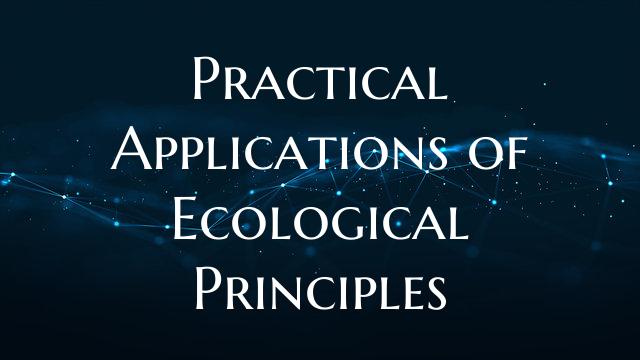Practical Applications of Ecological Principles
Ecological principles, which encompass the relationships and interactions between living organisms and their environment, have a wide range of practical applications in various fields. By understanding and applying these principles, we can make informed decisions to promote sustainability, conservation, and overall well-being of ecosystems. Here are some practical applications of ecological principles:
1. Sustainable Agriculture: Ecological principles such as nutrient cycling, biodiversity, and natural pest control can be applied in agriculture to reduce reliance on synthetic fertilizers and pesticides. Practices like crop rotation, intercropping, and integrated pest management help maintain healthy soil and minimize environmental impact.
2. Ecosystem Restoration: Ecological principles guide restoration efforts of degraded ecosystems like forests, wetlands, and grasslands. By understanding the native species, succession patterns, and ecosystem functions, restoration projects can be more effective in recreating functional and biodiverse habitats.
3. Urban Planning: Designing cities and urban landscapes with ecological principles in mind can improve air and water quality, reduce urban heat islands, and provide habitats for wildlife. Green infrastructure, such as green roofs, permeable pavements, and urban parks, help mitigate the environmental impacts of urbanization.
4. Conservation Biology: Ecological principles are fundamental to conservation efforts aimed at protecting endangered species, preserving biodiversity hotspots, and maintaining ecosystem resilience. Concepts like habitat connectivity, genetic diversity, and population dynamics inform conservation strategies to ensure the long-term survival of species and ecosystems.
5. Climate Change Mitigation: Understanding ecological processes like carbon sequestration, ecosystem resilience, and climate feedback loops is crucial for developing effective strategies to mitigate and adapt to climate change. Protecting and restoring natural ecosystems, such as forests and wetlands, play a vital role in sequestering carbon and regulating the climate.
6. Natural Resource Management: Ecological principles guide sustainable management practices for ecosystems such as fisheries, forests, and water resources. Concepts like carrying capacity, resource regeneration, and ecosystem services help ensure the responsible use of natural resources while maintaining ecosystem health and productivity.
7. Education and Outreach: Educating the public about ecological principles is essential for fostering environmental awareness and promoting sustainable behaviors. By incorporating ecological concepts into educational programs, nature-based tourism, and community engagement initiatives, we can inspire individuals to make informed decisions for the benefit of the environment.
In conclusion, the practical applications of ecological principles are diverse and essential for addressing environmental challenges, promoting sustainability, and conserving biodiversity. By integrating these principles into various aspects of society, we can create a more harmonious relationship between humans and the natural world.

